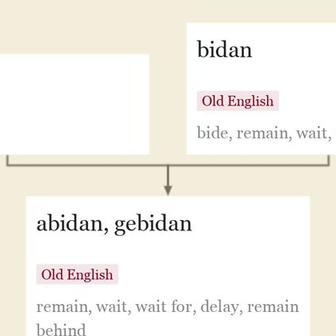abidance (n.)
「持续或遵守的行为」,1640年代,来自 abide(遵守)+ -ance。
abidance 的相关词汇

中古英语 abiden,源自古英语 abidan, gebidan “保持,等待,等待,延迟,落后”,源自 ge- 完成前缀(表示向前运动; 见 a-(1))+ bidan “等待,保持,等待,居住”(见 bide)。
最初是不及物动词(带有对象的属格: we abidon his “我们等他”); “忍受,承受,坚定不移,容忍,忍受”(现在通常带有否定意义)的及物意义来自公元1200年左右。与某人 a bide with “与某人在一起; 与某人同居; 继续服务于某人”来自公元1300年左右。
相关: Abided; abiding。历史时态是 abide, abode, abidden,但在现代英语中,形式通常较弱。
“word-forming element attached to verbs to form abstract nouns of process or fact (从 converge 中得到的 convergence), or of state or quality (从 absent 中得到的 absence); 最终源自拉丁语 -antia 和 -entia,这取决于词干中的元音,源自 PIE *-nt-,形容词后缀。”
拉丁语中,用于动词词干 -a- 的现在分词词尾与 -i- 和 -e- 中的词尾有所区别。因此,现代英语中的 protest a nt, oppon e nt, obedi e nt 源自拉丁语 protestare, opponere, obedire。
随着古法语从拉丁语演变而来,这些词尾被统一为 -ance,但后来从拉丁语借用的法语词汇(其中一些后来传入英语)使用了适当的拉丁语词尾形式,同样,英语直接从拉丁语借用的词汇也使用了这种形式(diligence , absence)。
因此,英语从法语继承了一大堆混乱的词汇(crescent / croissant),并且自15世纪以来,通过有选择地恢复这些词汇的某些形式中的 -ence 以符合拉丁语,进一步增加了混乱。因此, dependant,但 independence,等等。